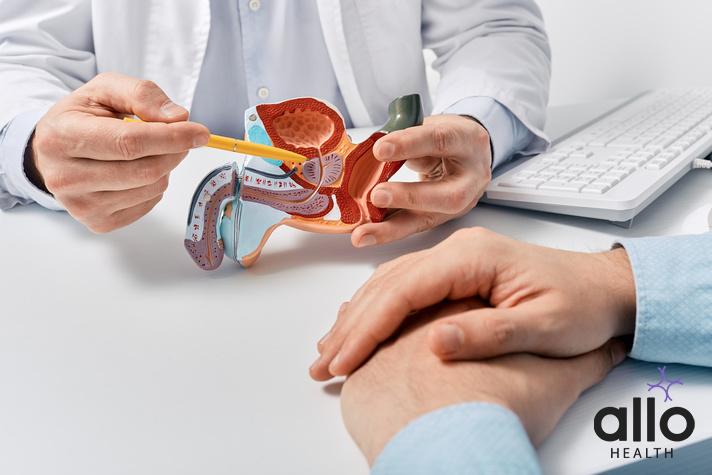Do Steroids Cause Erectile Dysfunction?

"The following blog article provides general information and insights on various topics. However, it is important to note that the information presented is not intended as professional advice in any specific field or area. The content of this blog is for general educational and informational purposes only.
Book consultation
The content should not be interpreted as endorsement, recommendation, or guarantee of any product, service, or information mentioned. Readers are solely responsible for the decisions and actions they take based on the information provided in this blog. It is essential to exercise individual judgment, critical thinking, and personal responsibility when applying or implementing any information or suggestions discussed in the blog."
Steroids are a type of hormone that are often used by athletes and bodybuilders to improve their performance and build muscle mass. While these drugs can have significant benefits for some users, they also carry a range of risks and side effects. One of the potential side effects that has been linked to steroid use is erectile dysfunction (ED).
What are Steroids?
- Steroids are a type of organic molecule with a characteristic structure consisting of four rings of carbon atoms.
- They are produced naturally in the human body and have a variety of important physiological functions, including regulating metabolism, controlling inflammation, and supporting growth and development.
- There are two main types of steroids: corticosteroids and anabolic steroids.
- Corticosteroids are hormones produced by the adrenal gland and are involved in the regulation of the immune system and inflammation. They are often used medically to treat conditions such as asthma, allergies, and autoimmune diseases.
- Anabolic steroids, on the other hand, are synthetic versions of the male sex hormone testosterone. They are used to increase muscle mass, strength, and athletic performance and are commonly abused by athletes and bodybuilders. Anabolic steroids can have serious side effects, including liver damage, cardiovascular disease, infertility, and mood disorders.
- Steroids can also refer to a group of synthetic drugs that are used to treat a variety of medical conditions. These drugs are often used to reduce inflammation and pain and are commonly used to treat conditions such as arthritis, lupus, and multiple sclerosis.
- However, like anabolic steroids, these drugs can have serious side effects if used improperly or over a long period of time.
- It is important to use these medications under the guidance of a healthcare professional.
Do Steroids Cause Erectile Dysfunction?
- The use of anabolic steroids has been associated with the development of erectile dysfunction (ED).
- Anabolic steroids are synthetic derivatives of testosterone, a male hormone that plays a key role in sexual function.
- While anabolic steroids are often used to enhance athletic performance and increase muscle mass, their use can have harmful effects on the male reproductive system.
- One of the primary ways in which anabolic steroids can cause ED is by suppressing the body’s natural production of testosterone.
- The use of anabolic steroids can lead to a decrease in the production of testosterone in the testes, which can result in a variety of sexual concerns, including ED.
- Testosterone is necessary for the development and maintenance of the male reproductive system, including the penis, and a decrease in testosterone levels can lead to a decreased ability to achieve or maintain an erection.
- Anabolic steroids can have direct effects on the blood vessels that supply the penis. These drugs can cause the blood vessels to constrict, reducing blood flow to the penis and making it more difficult to achieve an erection.
- This effect may be reversible once the use of steroids is discontinued, but in some cases, it can be long-lasting or permanent.
- Anabolic steroids can also have psychological effects that may contribute to ED. The use of these drugs can lead to mood changes, including depression, anxiety, and irritability, which can negatively impact sexual function.
- Additionally, the use of anabolic steroids can be associated with a sense of inadequacy or low self-esteem, which may also contribute to sexual concerns.

Risk Factors for Steroid-Induced Erectile Dysfunction
Steroid-induced erectile dysfunction (ED) can occur in men who use anabolic steroids to enhance athletic performance or build muscle mass. Several risk factors may increase the likelihood of developing steroid-induced ED.
- Dose and duration of steroid use: The higher the dose and longer the duration of steroid use, the greater the risk of developing ED. The risk of ED may also increase with the frequency of steroid use.
- Age: Age is a significant risk factor for ED, and older men may be more susceptible to steroid-induced ED. This may be due to age-related changes in hormone levels and blood flow.
- Pre-existing medical conditions: Men with pre-existing medical conditions such as cardiovascular disease, diabetes, and hypertension may be more susceptible to steroid-induced ED. These conditions can impair blood flow to the penis and decrease the ability to achieve or maintain an erection.
- Lifestyle factors: Lifestyle factors such as smoking, alcohol use, and a sedentary lifestyle can increase the risk of ED. Steroid use may exacerbate the negative effects of these factors on sexual function.
- Psychological factors: Psychological factors such as stress, anxiety, depression, and low self-esteem can contribute to ED. Steroid use can exacerbate these factors and increase the risk of ED.
- Genetics: Some men may be genetically predisposed to develop ED. This may be due to variations in genes that regulate blood flow or hormone levels.
How Do Steroids Affect Sex Drive?
Anabolic steroids are synthetic versions of testosterone, the male hormone responsible for regulating sex drive (libido) and sexual function. When anabolic steroids are taken, they can increase testosterone levels in the body, which can lead to an increase in sex drive.
However, the effects of anabolic steroids on sex drive can be complex and may depend on several factors, including the dose and duration of steroid use, age, pre-existing medical conditions, and individual differences in hormonal responses.
In some cases, anabolic steroids can cause a decrease in sex drive or even a loss of interest in sex. This can be due to several factors, including:
- Suppression of natural testosterone production: Anabolic steroids can suppress the body’s natural production of testosterone, which can lead to a decrease in sex drive.
- Hormonal imbalances: Anabolic steroids can disrupt the delicate balance of hormones in the body, which can affect sexual function and libido.
- Psychological factors: Anabolic steroids can also have psychological effects, such as increased aggression and mood swings, which can affect sexual desire and function.
- Sexual dysfunction: Long-term use of anabolic steroids can cause sexual dysfunction, including ED and decreased sperm count, which can lead to a decrease in sex drive.
Anabolic steroids can affect sex drive in both positive and negative ways. While they may initially increase sex drive by raising testosterone levels, long-term use can lead to hormonal imbalances, sexual dysfunction, and other factors that can cause a decrease in sex drive. Men who are concerned about the effects of anabolic steroids on sex drive should talk to a healthcare professional for advice and support.

Anabolic Steroid Misuse
Anabolic steroids are synthetic versions of testosterone, the male hormone responsible for regulating sex drive (libido) and sexual function. When anabolic steroids are taken, they can increase testosterone levels in the body, which can lead to an increase in sex drive.
However, the effects of anabolic steroids on sex drive can be complex and may depend on several factors, including the dose and duration of steroid use, age, pre-existing medical conditions, and individual differences in hormonal responses.
In some cases, anabolic steroids can cause a decrease in sex drive or even a loss of interest in sex. This can be due to several factors, including:
- Suppression of natural testosterone production: Anabolic steroids can suppress the body’s natural production of testosterone, which can lead to a decrease in sex drive.
- Hormonal imbalances: Anabolic steroids can disrupt the delicate balance of hormones in the body, which can affect sexual function and libido.
- Psychological factors: Anabolic steroids can also have psychological effects, such as increased aggression and mood swings, which can affect sexual desire and function.
- Sexual dysfunction: Long-term use of anabolic steroids can cause sexual dysfunction, including ED and decreased sperm count, which can lead to a decrease in sex drive.
Psychological Effects Of Steroids
While anabolic steroids have legitimate medical uses, they are often misused by individuals seeking to improve their athletic performance or physical appearance. In addition to physical side effects, anabolic steroid use can also have psychological impacts.
- Mood swings: Anabolic steroids can cause mood swings, including increased aggression, irritability, and mood swings. This is sometimes referred to as “roid rage.”
- Depression: Anabolic steroid use can also cause depression, particularly when individuals stop using steroids and experience a sudden drop in testosterone levels.
- Anxiety: Anabolic steroid use can cause anxiety, particularly in individuals who are prone to anxiety disorders.
- Body image concerns: Anabolic steroid use can cause individuals to become preoccupied with their physical appearance, leading to body image concerns.
- Addiction: Anabolic steroid use can lead to addiction, particularly in individuals who use steroids for a long period of time or in high doses.
- Increased risk of suicidal thoughts and behaviors: Anabolic steroid use has been associated with an increased risk of suicidal thoughts and behaviors, particularly in individuals with pre-existing mental health conditions.
Not all individuals who use anabolic steroids will experience psychological side effects. However, the risk of these side effects increases with the dose and duration of steroid use and may be more common in individuals with pre-existing mental health conditions.
Steroids are a type of hormone that can have significant benefits for some users, but also carry a range of risks and side effects. One potential side effect that has been linked to steroid use is erectile dysfunction (ED). While the exact mechanisms behind this side effect are not fully understood, there are several possible explanations, including interference with testosterone production, damage to blood vessels, and psychological factors.
If you are experiencing ED as a result of steroid use, there are several treatment options available, including medications, lifestyle changes, psychological counseling, and testosterone replacement therapy. It is also important to take steps to prevent steroid-induced ED, such as using the lowest effective dose, limiting the duration of use, getting regular check-ups, and maintaining a healthy lifestyle.
Treatment Options for Steroid-Induced Erectile Dysfunction
Steroid-induced erectile dysfunction (ED) can be a distressing side effect for men who use anabolic steroids. The treatment options for steroid-induced ED depend on the underlying cause and severity of the condition. Here are some of the treatment options available:
- Discontinuing steroid use: The first step in treating steroid-induced ED is to discontinue the use of anabolic steroids. This allows the body to return to its natural hormonal balance and may improve sexual function over time.
- Medications: Medications such as phosphodiesterase type 5 (PDE5) inhibitors, including sildenafil (Viagra), tadalafil (Cialis), and vardenafil (Levitra), are commonly prescribed for the treatment of ED. These medications work by increasing blood flow to the penis, which can help improve erectile function. However, they should be used with caution in men who have cardiovascular disease or are taking nitrate medications.
- Hormone therapy: In some cases, hormone therapy may be prescribed to restore natural testosterone levels in men who have low testosterone levels. However, hormone therapy should only be prescribed by a healthcare professional and monitored closely, as it can have significant side effects.
- Psychotherapy: In cases where psychological factors are contributing to ED, psychotherapy or counseling may be helpful. This can help men address underlying emotional concerns and improve sexual function.
- Lifestyle changes: Making lifestyle changes such as quitting smoking, reducing alcohol consumption, and getting regular exercise can improve overall health and may also improve sexual function.
- Other treatments: Other treatments such as penile injections, vacuum devices, and penile implants may also be considered in some cases.

Preventing Steroid-Induced Erectile Dysfunction
The best way to prevent steroid-induced erectile dysfunction is to avoid steroid use altogether. However, for those who do choose to use steroids, there are several things you can do to reduce your risk of developing ED.
- Use the lowest effective dose: Using the lowest effective dose of steroids can help to reduce your risk of developing ED. Talk to your doctor about the appropriate dosage for your needs.
- Limit the duration of use: The longer you use steroids, the greater your risk of developing ED. Try to limit your use of steroids to the shortest possible duration.
- Get regular check-ups: Regular check-ups with your doctor can help to identify any potential health concerns early on, allowing for prompt treatment and prevention of complications.
- Maintain a healthy lifestyle: Eating a healthy diet, getting regular exercise, and avoiding smoking and excessive alcohol consumption can all help to reduce your risk of developing ED.
Key Takeaways
- Steroids, including anabolic steroids, have significant benefits for some users but also carry risks, such as erectile dysfunction (ED).
- Anabolic steroids, synthetic versions of testosterone, are commonly used to enhance muscle mass and athletic performance.
- Steroids can cause ED by suppressing natural testosterone production, affecting blood vessels supplying the penis, and contributing to psychological factors.
- Risk factors for steroid-induced ED include dose and duration of use, age, pre-existing medical conditions, lifestyle factors, psychological factors, and genetics.
- Steroids can impact sex drive, initially increasing it by raising testosterone levels, but long-term use may lead to hormonal imbalances and sexual dysfunction.
- Treatment options for steroid-induced ED include discontinuing steroid use, medications, hormone therapy, psychotherapy, lifestyle changes, and other interventions.
Frequently Asked Questions
Q: How do steroids contribute to erectile dysfunction (ED)?
A: Steroids, particularly anabolic steroids, can suppress the body’s natural production of testosterone, leading to hormonal imbalances. This, coupled with effects on blood vessels and psychological factors, can contribute to the development of ED.
Q: Is steroid-induced ED reversible?
A: In some cases, discontinuing steroid use may lead to a reversal of the ED. However, the reversibility depends on factors such as the duration and intensity of steroid use and individual health conditions. It’s advisable to seek medical advice for a personaliSed assessment.
Q: What are the risk factors for steroid-induced ED?
A: Risk factors include the dose and duration of steroid use, age, pre-existing medical conditions (such as cardiovascular disease or diabetes), lifestyle factors (like smoking and sedentary habits), psychological factors, and genetic predispositions.
Q: Can steroid-induced ED be prevented?
A: The best prevention is to avoid steroid use altogether. If using steroids, it’s crucial to adhere to the lowest effective dose, limit the duration of use, and maintain a healthy lifestyle. Regular check-ups with a healthcare professional can also help in early detection and prevention.
Q: Can steroid-induced erectile dysfunction affect libido?
A: Yes, steroid-induced ED can impact libido. Anabolic steroids, while initially increasing sex drive by raising testosterone levels, may lead to a decrease in libido over time. Factors such as suppressed natural testosterone production, hormonal imbalances, psychological effects like increased aggression and mood swings, and long-term sexual dysfunction can contribute to a reduction in overall sexual desire. Individuals experiencing concerns about their libido due to steroid use should consult a healthcare professional for guidance and support.
References
To ensure the accuracy and credibility of this article, the following reputable sources were consulted:
- Mayo Clinic. (2021). Erectile dysfunction. https://www.mayoclinic.org/diseases-conditions/erectile-dysfunction/symptoms-causes/syc-20355776
- National Institute on Drug Abuse. (2021). Anabolic steroid drug facts. https://www.drugabuse.gov/publications/drugfacts/anabolic-steroids
- National Institute of Diabetes and Digestive and Kidney Diseases. (2021). Erectile dysfunction. https://www.niddk.nih.gov/health-information/urologic-diseases/erectile-dysfunction
- U.S. National Library of Medicine. (2021). Testosterone. https://medlineplus.gov/testosterone.html







































